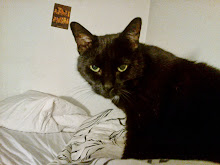Originally posted at Fatly Yours on Tuesday, October 30, 2007
In my sugar post, I brought up food demonizing, but didn't really discuss it further. I'd like to expand on why I feel that fat positivity also means food positivity. This is very close to what I've read at Shapely Prose about HAES (health at every size) thinking, so maybe "food positivity" is really just another word for HAES.
Most of us would agree that Fat Acceptance is against thinking along these lines:
" [Obesity] causes disease and death. When we get rid of [obesity], people will live longer, healthier lives."
This demonizes obesity as the root cause of any health problem, and makes professionals ignore signs of disease in a fat person - "It looks like your BMI is 40, so lose some weight, that's bound to end your cough/headaches/joint pain/unstoppable nose bleeds." It also makes people look down on fat people as a problem in modern society, something that needs to be stopped or controlled before obesity takes over and kills us all.
If you take this type of idea and replace obesity with anything - sugar, fat, processed foods, additives, animal products, etc. - you're still thinking in the same language as the fat-haters. The problem isn't only with the idea that obesity is the big bad wolf that causes problems; the problem is the structure of the idea itself.
This kind of thinking implies that
a) Disease can be prevented, maybe not in every case but certainly in most cases.
b) Ergo, if you get a disease, it's likely to be your own fault. You should feel shame and guilt.
c) People with Disease X are overeaters of Food Group X. They're paying the price for their lack of control, and they need to learn about moderation.
d) If I didn't develop Disease X, that means I've eaten Food Group X moderately. Maybe that means I'm a bit more informed and in control than those with the disease.
It implies fear: food is to be used with extreme caution and only for nutrition purpose, and if you let it take over, it'll kill us all. It also acts to justify negative perceptions of sick people, labeling them as "overeaters" or "gluttons", "ignorant" or "irresponsible". It offers an easy solution that doesn't work for everyone, and if you can't comply with that easy solution - say, giving up white sugar completely - you are "weak", "out of control", "a victim for the big corporations", and so forth. Of course, said easy solution is easy only on the thought level and requires lots of effort in your everyday life to make it work, which serves to make you feel proud of yourself and your accomplishment. This might make you seek validation from others and constantly tell them how you feel so much better now and they should do the same thing you did. Which is exactly what dieters tend to do.
This kind of thinking doesn't liberate people from ideals that tie us down. It only ties us down further into food creeds. What's more, my experience is that a lot of people who think in these terms also think, either overtly or subtly, that obesity, like diseases, is usually caused by overconsumption of Food Group X (see, for example, certain vegetarians attacking Michael Moore for his weight). It's a very logical idea that if certain foods are bad and fat is bad, limiting or giving up said foods will make the fat people slim, or mildly chubby at the very most, and everyone will be healthier. No one will gain weight ever again, because they're "eating right". In other words, food demonizing usually masks fatist attitudes.
The idea that there are "bad" or "wrong" foods is a moral judgement. It also reflects negatively on the people who eat said foods. If you talk about "bad foods", that usually implies that you think people who eat those foods are also bad, and if you eat them, you are bad. This results in a feeling of guilt after eating these foods and a firm resolution to never eat them again, or at least limit them considerably. It serves to create gaps between people where gaps are not needed, and most importantly, it makes us view our own bodies and natural hunger negatively. We become overeaters, gluttons, irresponsible, ignorant, ugly, bad, shameful, the moment we eat the wrong foods. There's nothing liberating about that. It's clearly tied to fat shame - most of us have probably felt the 'fat feeling' after eating certain foods, or just eating too much of something. You're out of control, hence you're fat.
I can't say I'm entirely over this kind of thinking. I still sometimes feel guilty after eating a whole bag of candy or a big burger meal, and I must admit I've come to a realization about more holistic health thinking very recently. I might still feel inferior when I see others order the salad while I'm having a pizza. Food demonizing is deeply rooted within all of us, because it's how our culture views food. However, I do see it as one of the goals of FA to break such myths and re-introduce a happier kind of eating, a kind of eating that isn't primarily a danger or an immoral act.
Food doesn't have to be a battle of good and evil. It can just be a simple joy in our everyday lives. If we can let our guard down and just relax.
Sad and Tired
13 years ago
